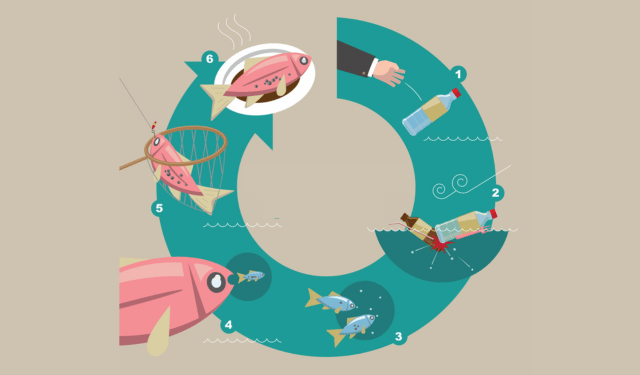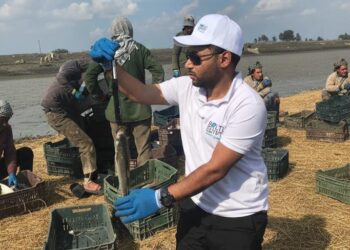Microplastics in the sea, an invisible threat on our plates – In the heart of the sea, a silent and invisible enemy is creeping into the tissues of the marine organisms we consume daily. A recent study by US researchers revealed the widespread presence of anthropogenic particles – mainly microplastics – in the edible tissues of commercially important fish species from the US West Coast, such as Chinook salmon, Lingcod cod and pink shrimp.
According to the data collected, almost 99% of the samples analysed contained residues of plastic-derived particles. Among the main culprits were synthetic fibres released during the washing of clothing, microbeads from cosmetic products and plastic fragments generated by the degradation of waste. These contaminants not only reach the sea via rivers, but also accumulate along the food chain, eventually arriving on our tables.
Microplastics were found in higher concentrations in pink shrimps (10 particles per gram of tissue) and, to a lesser extent, in the tissues of fish such as Chinook, which occupy higher positions in the trophic chain. These data raise critical questions about the biomagnification of microplastics and their potential impacts on human health.
Human health and the environment at risk
Ingesting microplastics can have serious consequences. Studies suggest that these contaminants can cause inflammation, oxidative stress and enzymatic changes in organisms. For humans, the consumption of contaminated marine food represents a continuous and underestimated exposure.
Possible solutions
To counter this emergency, concerted action is crucial. Fish and seafood producers could opt for environmentally friendly packaging, reducing the transfer of plastic particles during processing and distribution. At the same time, consumers can contribute by choosing local and unprocessed fish, thus avoiding additional contamination.
The scientific community emphasises the urgency of developing stricter regulations for plastic waste management and promoting innovative microfibre filtration technologies in sewage plants. Only in this way will it be possible to mitigate the impact of this silent pollutant.
The fishing industry and consumers have a key role to play in shaping the future of our relationship with the sea. Protecting marine ecosystems is not only a moral duty, but a necessity to ensure a safe and sustainable food supply for future generations.
This study is a wake-up call, a call to action to prevent a problem that could irreversibly compromise the ecological balance and human health.
Microplastics in the sea, an invisible threat on our plates







